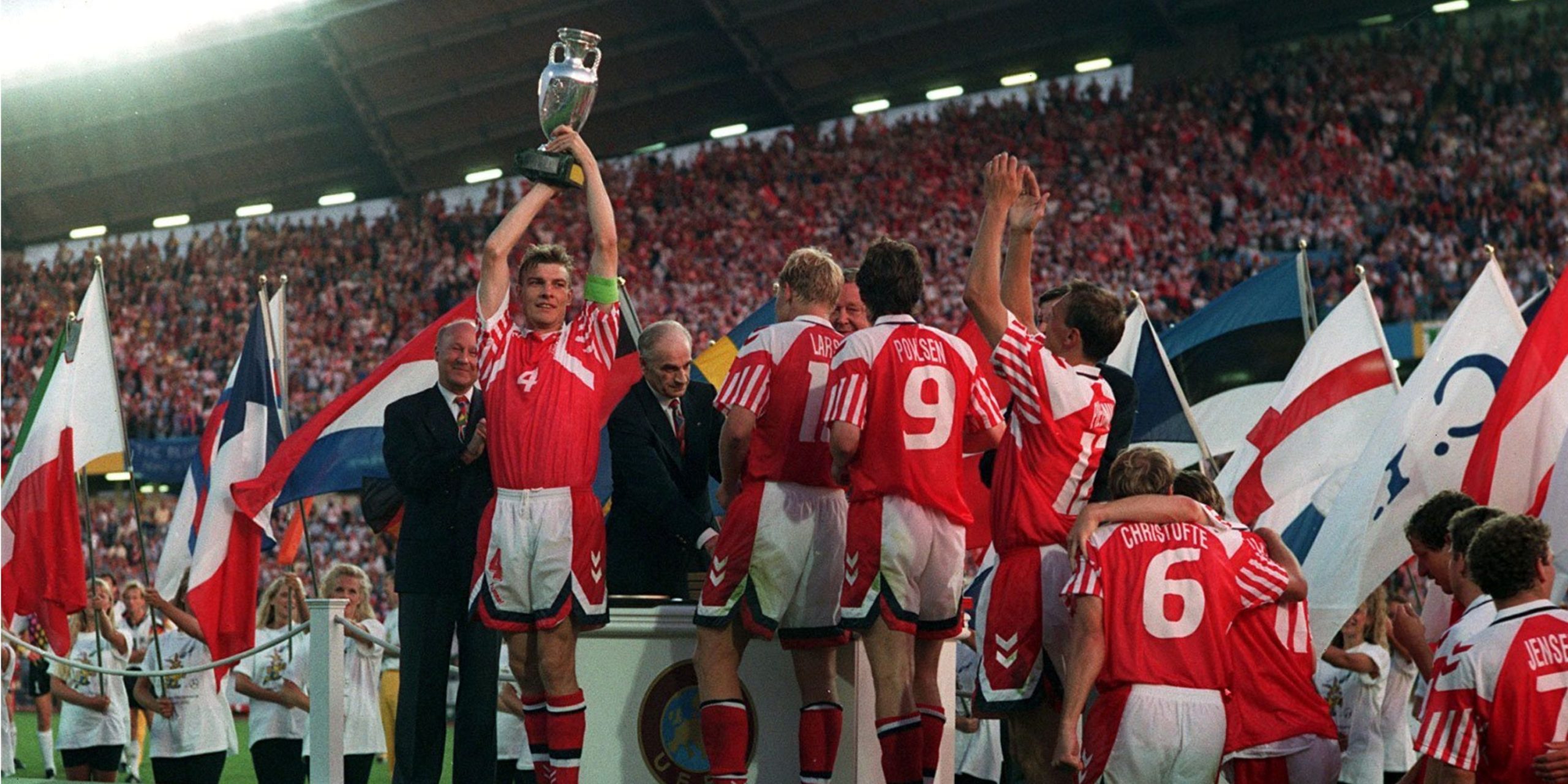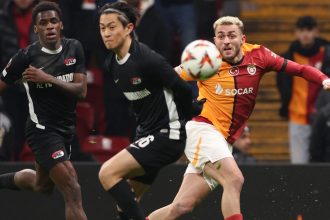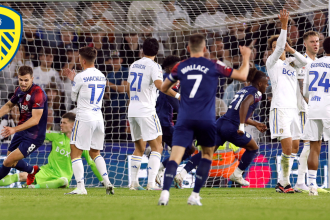Denmark performed a miracle in 1992, somehow winning the European Championship – despite not actually qualifying for the tournament. It is the unlikeliest win in football history and we're not sure how it'll ever be beaten.
This was a team that shouldn't have been near the trophy anyway, wasn't supposed to be there and even lacked the greatest player in their history. Yet, Denmark made history against just about every odd.
Here at Football Fancast, we've got all you need to know about how Euro '92 went down.
How Denmark qualified for Euro 1992
They didn't. The European Championship was a much smaller competition back then, with only eight teams qualifying. There were seven qualifying groups from which only the winners made it through to the finals, joining the host nation.
The host nation in 1992 was Sweden, so they had automatic entry. France, England, Scotland, Germany and the Netherlands were the other non-complicated qualifiers. Then things were a bit of a mess.
C.I.S were one team, which needs some explanation. This was the Commonwealth of Independent States. The Soviet Union had qualified but then collapsed, and were replaced by C.I.S. This was essentially the same team just under a different, temporary name.
Then there was Yugoslavia. They were a very strong team back then, reaching the 1990 World Cup quarter-finals and finishing above Denmark to win their qualifying group. However, the war which led to the nation's eventual break-up saw UN sanctions that prohibited their national team from competing. UEFA made the decision to replace them with the Group 4 runners-up, Denmark, as a result.
And so the Danes were in. Somehow.
Denmark were no slouches
Denmark had won six of their eight qualifying games, losing to Yugoslavia and drawing with Northern Ireland. That got them second in the group and, as spoken about above, within a point of qualification.
But it's important to note that no one gave them a chance here. Denmark hadn't qualified for the 1990 World Cup two years prior, nor would they make it to the following World Cup in 1994. They'd exited at the group stage in the 1988 European Championships, too.
So while there were some great players in the side, this was not a team with any great reputation. And, of course, they didn't even have all of their great players – they arguably lacked their greatest…
Denmark's best players at Euro 1992
Two players in the squad really stood out – Peter Schmeichel and Brian Laudrup. That's highlighted by the fact they finished 5th and 6th respectively in the Ballon d'Or voting for 1992, with Marco van Basten taking the gong for the third time in his career.
It's worth noting that Michael Laudrup finished 7th. He'd almost certainly have won the award if he'd been involved with the Euro '92 victory, though it's very debatable whether it could have happened with him in the side.
Peter Schmeichel truly announced himself
Peter Schmeichel had joined Manchester United in 1991, so he'd played one season with them ahead of this tournament. His reputation was growing rapidly, too.
The Dane was a relative unknown when he moved to United. His performances for Brondby in the UEFA Cup essentially earned him that move, but it was at Euro '92 that the world really saw just how good he was.
Schmeichel was essential as both someone to pass the ball back to but also as a world-class shot-stopper. His saves in the final are iconic, as is his penalty save from Marco van Basten in the semi-final.
The IFFHS named Schmeichel the world's best goalkeeper in both 1992 and 1993 following this tournament – awards he'd never win again. UEFA repeated the 1992 and 1993 awards, but did also name him the best in 1998.
Michael Laudrup was Denmark's star man…
Michael Laudrup is unquestionably the greatest footballer that Denmark has ever produced. He was one of the absolute best in the world in the late 80s/early 90s – there were periods where you could easily argue that he was the best.
Laudrup was a vital piece of Johan Cruyff's dream team at Barcelona, playing as the main playmaker in the side. That team was, until Pep Guardiola's, the best the Catalonians had seen, winning their first European Cup in 1992.
He'd remain with Barcelona until 1994, before falling out with Cruyff and leaving on a free transfer to join Real Madrid. Guardiola, then a teammate of Laudrup's, reportedly cried when he heard.
One fact is always good to show off just how important Laudrup was at the time. In the 1993/94 season, the Dane was at Barcelona as they won La Liga and beat Real Madrid 5-0 as their rivals finished fourth. The following season, he was at Real Madrid as they won La Liga and beat Barcelona 5-0 as their rivals finished fourth.
In other words, Laudrup was fantastic.
…but he stayed on holiday
Despite being Denmark's main man, Laudrup's decision to give the tournament a miss makes what was to come even more remarkable.
Laudrup, along with his brother Brian, fell out with manager Richard Møller Nielsen just three games into the qualifying campaign. They promptly withdrew from the squad and didn't feature again in qualifying.
Brian Laudrup would return to the squad after their 'qualification', however, and played an integral role. Michael, though, reportedly rated Denmark's chances so lowly that he didn't see much point in abandoning his holiday plans.
He remained at home for the tournament but did make a return the following year. Something must have changed his mind.
Euro 92 saw the end of the backpass
This is a strange one for anyone who started watching football post-1992, but goalkeepers used to be able to pick the ball up in the box no matter how it arrived at them. In other words, there was no law preventing a goalkeeper from picking the ball up if his own teammate had passed to him with his feet.
"But couldn't teams just waste time by passing it back and forth to their goalkeeper?" you ask. Yes, they could and they very much did so. Italia '90, however, saw things go too far – in one game, Ireland's goalkeeper held onto the ball for a total of six minutes.
The laws of the game were changed as a result in an effort to stop such defensive football. Those laws only came into effect after Euro '92, though – this tournament saw the very last football without the backpass rule.
Denmark would take advantage.
The favourites at Euro '92
One team stood out above all: Germany. They had won the 1990 World Cup and finished second in the two tournaments before that. They'd finished third in Euro '88, too, narrowly losing in the semi-finals to eventual winners the Netherlands.
And it's worth mentioning the Netherlands here. They went into Euro '92 as holders and boasted some of the best players on the planet – Marco van Basten the standout alongside Ruud Gullit. A young Dennis Bergkamp would shine at the tournament, too.
France were a notable side going into it. They'd won every qualifying game and had Jean-Pierre Papin in their ranks – the reigning Ballon d'Or holder.
England perhaps had an outside chance. They'd impressed at Italia '90 but their qualification campaign was a struggle, with three wins and three draws in a group with the Republic of Ireland, Poland and Turkey.
Denmark's group at Euro '92
On paper, Denmark didn't have much of a chance of progression. They were in a group with hosts Sweden, France and England. Sweden and Denmark were comfortably the outsiders here, with the latter two fully expected to progress.
However, Sweden topped the group and Denmark came second as both England and France struggled. The Three Lions scored just one goal across their three games in a 2-1 defeat against Sweden that sealed their fate.
France didn't fare much better. They drew with both England and Sweden before losing 2-1 to Denmark. With that, the Danes escaped from their group as runners-up and were into the semi-finals.
Denmark in the Euro '92 semi-finals
Denmark went on to face Group B winners the Netherlands in the semis (yes, we're straight into the semi-final stage here given there were only eight teams to begin with). It was never going to be an easy fixture given Germany were the other team progressing from that group.
The Netherlands had the most star-studded lineup going, though. Van Basten, Ruud Gullit, Frank Rijkaard, Ronald Koeman and Dennis Bergkamp headlined – some of the absolute best players on the planet.
Henrik Larsen (not that one) put Denmark 1-0 up after just five minutes but Bergkamp equalised midway through the second half. Larsen then scored again before half-time, sending the Danes into the break with an unlikely lead. However, Rijkaard would strike with just a few minutes to play, forcing extra-time. No goals in that period sent things to penalties.
And a sign that it was Denmark's tournament arrived in the shootout. Every player scored but one – Van Basten. His spot-kick was heroically saved by Peter Schmeichel to send the unlikely entrants all the way to the final.
The Euro 1992 final
Denmark met, perhaps inevitably, world champions Germany in the Euro '92 final. Though, this German team hadn't been as impressive as many expected.
They'd only narrowly beaten Sweden to reach the final, squeezing past them 3-2. Their group stage campaign wasn't particularly good, either – the Netherlands beat them comfortably, while they'd also drawn with C.I.S. Their only win came against first-time entrants Scotland.
Despite that, Germany were unquestionably the better team from the start. They repeatedly tested Peter Schmeichel in goal, but it was Denmark who scored against the run of play. John Jensen opened things up on 18 minutes with his first international goal.
The favourites continued to push, of course, but Denmark had the lead they craved. They played an incredibly defensive game, taking full advantage of the pre-backpass rule era to find safety with Schmeichel. Despite being completely fine with holding onto the lead, though, Kim Vilfort struck on 78 minutes to wrap things up.
Denmark won 2-0, then, with what was the most unlikely win in the history of football. They weren't even supposed to be there…







